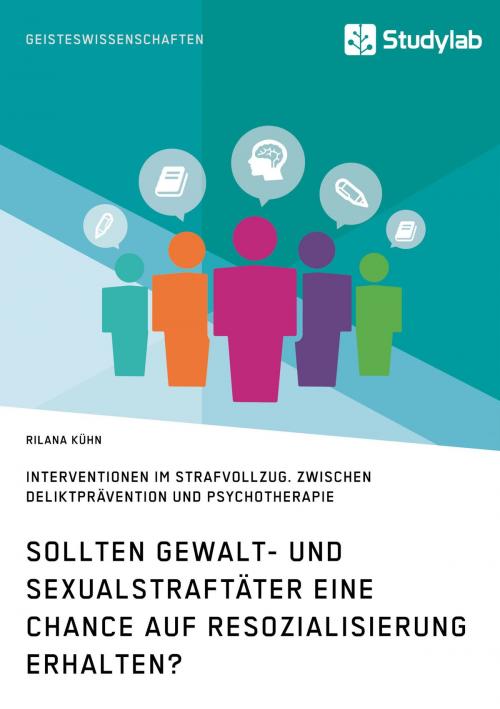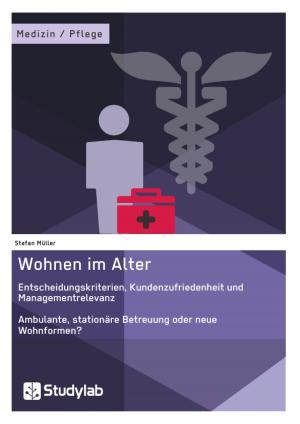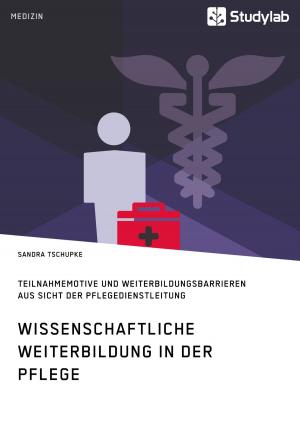Sollten Gewalt- und Sexualstraftäter eine Chance auf Resozialisierung erhalten?
Interventionen im Strafvollzug. Zwischen Deliktprävention und Psychotherapie
Nonfiction, Health & Well Being, Psychology, Forensic Psychology| Author: | Rilana Kühn | ISBN: | 9783668451544 |
| Publisher: | Studylab | Publication: | May 23, 2017 |
| Imprint: | Studylab | Language: | German |
| Author: | Rilana Kühn |
| ISBN: | 9783668451544 |
| Publisher: | Studylab |
| Publication: | May 23, 2017 |
| Imprint: | Studylab |
| Language: | German |
Die mediale Aufbereitung von Straftaten, insbesondere bei Sexualdelikten, führt oftmals nur zu einer verzerrten und stigmatisierenden Beurteilung in der Allgemeinheit. Die Forderungen nach lebenslanger Haft als Reaktion auf grausame Verbrechen werden demzufolge lauter. Doch ist eine Freiheitsberaubung auf Lebenszeit eine hinreichende Lösung? In diesem Buch beantwortet die Autorin die Frage, ob Gewalt- und Sexualstraftäter aus ethischer und finanzieller Sicht eine Chance auf Resozialisierung erhalten sollten. Aus dem Inhalt: - Risikofaktoren; - Erstdelinquenz; - Täter-Opfer-Beziehung; - Rückfälligkeit; - Kosten-Nutzen-Effizienz The following paper is meant to examine from an ethical as well as a financial point of view, whether violent and sex offenders should be given the chance of rehabilitation. The media coverage of crimes, especially in cases of sexual assault, often only leads to a distorted and stigmatizing evaluation in the general public. In response, the calls for life sentences are getting louder. But is a lifelong incarceration the most efficient solution? Answering this question first requires an objective view on the effectiveness of therapeutic interventions and their associated costs in prison. Due to the confirmed effectiveness and the result that the costs incurred by reducing the risk of recidivism through therapy are significantly lower than the costs incurred by the mere enforcement of sentences (penal system without therapy), hereinafter psychotherapy is presented in more detail. Thus, even offenders suffering from severe personality disorders can be treated successfully. Finally, punitive methods, such as the lifelong imprisonment, do not achieve the desired effect. After serving the sentence, violent and sex offenders should be given a perspective of life in freedom with the exception of such cases in with the risk of relapse is evaluated as above average by a qualified expert.
Die mediale Aufbereitung von Straftaten, insbesondere bei Sexualdelikten, führt oftmals nur zu einer verzerrten und stigmatisierenden Beurteilung in der Allgemeinheit. Die Forderungen nach lebenslanger Haft als Reaktion auf grausame Verbrechen werden demzufolge lauter. Doch ist eine Freiheitsberaubung auf Lebenszeit eine hinreichende Lösung? In diesem Buch beantwortet die Autorin die Frage, ob Gewalt- und Sexualstraftäter aus ethischer und finanzieller Sicht eine Chance auf Resozialisierung erhalten sollten. Aus dem Inhalt: - Risikofaktoren; - Erstdelinquenz; - Täter-Opfer-Beziehung; - Rückfälligkeit; - Kosten-Nutzen-Effizienz The following paper is meant to examine from an ethical as well as a financial point of view, whether violent and sex offenders should be given the chance of rehabilitation. The media coverage of crimes, especially in cases of sexual assault, often only leads to a distorted and stigmatizing evaluation in the general public. In response, the calls for life sentences are getting louder. But is a lifelong incarceration the most efficient solution? Answering this question first requires an objective view on the effectiveness of therapeutic interventions and their associated costs in prison. Due to the confirmed effectiveness and the result that the costs incurred by reducing the risk of recidivism through therapy are significantly lower than the costs incurred by the mere enforcement of sentences (penal system without therapy), hereinafter psychotherapy is presented in more detail. Thus, even offenders suffering from severe personality disorders can be treated successfully. Finally, punitive methods, such as the lifelong imprisonment, do not achieve the desired effect. After serving the sentence, violent and sex offenders should be given a perspective of life in freedom with the exception of such cases in with the risk of relapse is evaluated as above average by a qualified expert.















